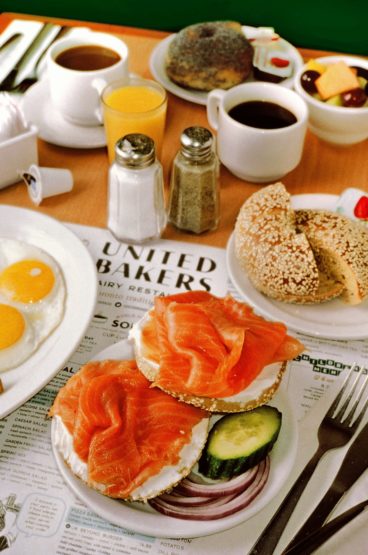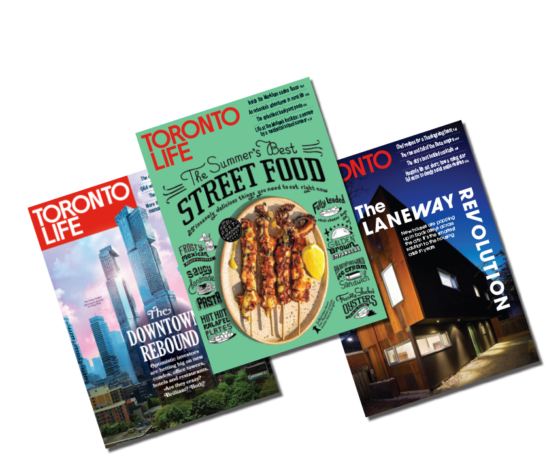“Cream cheese is the bonding agent of our community”: How bagels brought two branches of a Toronto family together

In Yiddish, there’s a word to describe an encounter or opportunity that seems to have been preordained across continents and generations, against all odds: bashert. Think destiny, but with more serendipity and struggle baked in. And it’s the only way to describe the recent union of bagel and smoked fish at the 112-year-old United Bakers Dairy Restaurant in North York. The Toronto Jewish mainstay is now featuring Primrose Bagel Co. bagels on Monday, Wednesday and Friday mornings—some of the city’s finest bagels being put to their best use on hallowed culinary ground. But what may seem like a minor menu tweak is really the latest chapter of a food-focused family saga that stretches back to pre–Second World War Poland, beginning at a Warsaw tavern. We spoke to cousins Sam Davis, the founder of Primrose Bagel Co., and Nathan Ladovsky, CEO and fourth-generation operator of United Bakers, about how bagels are once again uniting branches of their family tree.
Sam Davis: My bubbe Alice Ladovsky and her family ran a bar in Warsaw called Gruber Yossel, which, in English, translates to Fat Joe’s. It was named after my great-grandfather Joseph, who was, as you may have guessed, quite portly. There’s even a famous Polish song about the bar. It was truly a storied place and a meeting point for all different sorts of people, from dignitaries to underworld figures.
Nathan Ladovsky: My great-grandfather Aaron Ladovsky came to Canada in 1908, when he was still a teenager. In 1912, he opened United Bakers in the Ward, the neighbourhood that once existed where city hall now stands, where many new immigrants first settled. United Bakers became a gathering point for anyone who immigrated to Canada from the old country. People would get off the train at Union Station and someone would say, “You want a good breakfast? Go to Ladovsky’s.” In the 1920s, as Toronto’s Jewish population shifted from the Ward over to Kensington Market, United Bakers relocated to 338 Spadina Avenue, where it remained until 1986.

Sam: After the Nazi infiltration in 1939, Fat Joe’s continued to operate in what was then the Warsaw Ghetto. But then my bubbe was sent to a concentration camp. After 60 years, Gruber Yossel closed for good. Thankfully, Alice survived and eventually met her future husband, Alex, in a refugee camp that housed survivors of the Holocaust. They married there but had nowhere to go. Their families were so spread out, and they didn’t even know who was alive anymore. So Alice wrote to the Ladovskys in Toronto to ask if they would sponsor her and Alex to come to Canada. They agreed.
Nathan: And that’s very much what we’ve always tried to do here. It’s through our hospitality that we make people feel really comfortable and feel at home in this country.
Sam: When Alice and Alex arrived in Toronto, around 1949, they were taken in by Herman and Dora Ladovsky, Nathan’s grandparents and the second-generation owners of United Bakers. Alex and Alice had just gone through the hardest thing anyone can go through, but immediately they’re welcomed into an apartment with long-lost relatives, living above a restaurant that serves the food of their homeland. My bubbe had her first child in that apartment. And, the story goes, the Ladovskys slept on the floor so that she could have the bed while she was pregnant. Hospitality really does run in their blood.
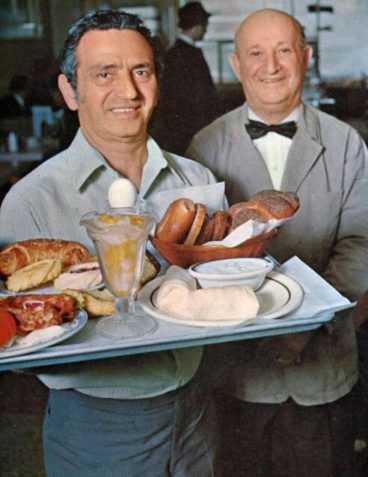
Nathan: We often get people coming into the restaurant still carrying luggage—they want this to be their first meal after they touch down, so they come straight from the airport. To me, that’s one of the biggest compliments anyone can pay me. If they choose our place to create that sense of home and comfort, it becomes our duty to provide extra hospitality through our actions and our food.
Sam: My zayde Alex began working in the largely Jewish garment trade on Spadina—the schmatte business, as it was known. He later went on to co-found Primrose Garment Company, a high-end women’s coat manufacturer. Primrose Garment is the inspiration for the name of our bagel company. It’s even where we got our logo—my zayde’s original design. His factory was at Adelaide and Spadina, so not too far from where United Bakers was at the time. He’d go up the street and buy bagels and serve them to his customers and staff at his garment factory. So that was technically the first time United Bakers and Primrose collaborated.
Nathan: My father, Philip, and my aunt Ruthie opened United Bakers at Lawrence Plaza in 1984 and closed the Spadina location two years later, so there was some overlap. Word got out that United Bakers was now in Lawrence Plaza, and business started booming. I grew up in the restaurant, running around and playing host. It was a lot of fun as a kid. I first started working there in 2005, when I was 16—bussing tables and washing dishes during evening shifts. Later, I moved on to line cook and prep cook. Some mornings, I’d take the breakfast shift and then go to school smelling like onions. After university, I came back and continued to work at the restaurant. I wrote the LSAT a couple of times but did not get accepted to law school. I’m appreciative of that now, because I realized that a business degree was more appealing to me than a law degree. I was accepted into Cornell University’s school of hotel administration, and it was a fantastic experience. I came back to Toronto and began to apply what I learned there to the family business.
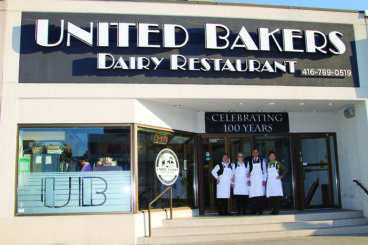

Sam: I took a finance degree at Western University and went to New York after I graduated. I lived there for a few years, working as a music journalist. I came back to Toronto and continued freelancing. I also did social media management for a public speaking company and eventually went on to work at a marketing agency. But I was a little unfulfilled. I always loved to cook. I grew up around food and around great cooks—my mom even ran a bed and breakfast in Antigua. After she passed away, I was at a bit of a crossroads, so I decided to enroll in the culinary management program at George Brown. I ended up training at Bar Isabel and then working at Tennessee Tavern and Bar Raval for a number of years.
Nathan: When Sam came back from New York, he started coming to the restaurant again. One day my dad said, “Your cousin Sam is here. He’s a music blogger.” We had never met before, but we both like to collect records, so we hit it off that way. Around this time, Sam had started baking, and I was very happy to test whatever he had made. As he was building the idea for his bagel business, we went on a bagel tour of Bathurst Street—otherwise known as the Hebrew Highway. That was a pivotal moment.

Sam: After that, I realized there was nowhere to get a really, really good New York–style bagel in Toronto. So I started experimenting with a modernized take on a traditional New York bagel, using a sourdough starter. I would give test bakes to former chefs, friends and people with a lot of bagel knowledge. Primrose Bagel Company began as a series of pop-ups. I put the bagels in a little bag stamped with my zayde’s logo, but I taped over the “Garment Company” part, so it just said “Primrose.” Then I got a message one day from Grant van Gameren, my former boss, saying, “I hear you’ve got bagels. Can I get three dozen?” Then word started getting out on Instagram. At the first few pop-ups, people were lined up around the block. Eventually, Grant let me use the Bar Isabel space, and I did a collaborative bake pop-up out of the restaurant. The lineup was even bigger that time. I had a few conversations with partners about locations before finding a spot way uptown in Oakwood Village. There was a little bit of negotiation, and we got a really favourable rent deal. Four months later, in early 2020, we were in business—but very unprepared for it, to be honest.

Nathan: And then Covid hit. It was a fantastic guise under which we could implement a bunch of changes at United Bakers. The word that comes to mind is pivot—it’s so overused, but when people think of the word pivot, they often think about the leg that swivels, not the leg that stays the same. Throughout the process, we honoured and recognized the cultural legacy that my father and my aunt—and grandparents and great-grandparents—had created, and that was the pillar that allowed us to manoeuvre throughout the pandemic. The words of my grandfather Herman rang very true in my ears: “Just keep the damn door open—do not close that door.”
Sam: For me, one of my earliest points in the business plan was to supply United Bakers. I was like, “I’ve got this connection and I know they go through a lot of bagels. If I can get them on the table there, at least I’ll be able to make a few bucks.” For me also, my knowledge of bagels and my nostalgic attachment to them was very much from spending time at United Bakers.
Nathan: Last summer, Sam mentioned to me that he was growing his wholesale business—his timing couldn’t have been better. One of our regular bagel suppliers was under new ownership, and they decided to do some renovations. As a result, they were going to be closed on Mondays and couldn’t fulfill their regular order with us. At the same time, Sam mentioned to me that he was growing his wholesale business. I was interested, obviously.
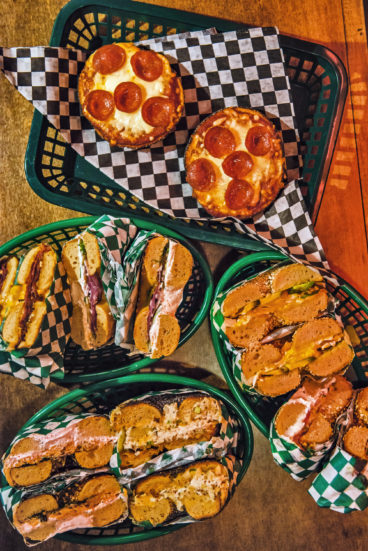
Sam: Where your product sits is as important as how much of it you’re selling. To me, having our bagels on the tables at UB is like having your watches in the windows of Birks. It’s the finest honour for a bagel.
Nathan: I’ve never seen a bagel shop sell out as quickly as Primrose does. I think, in a sense, scarcity helps breed demand. But, at the same time, we have to maintain accessibility to our food, which in turn creates accessibility to a culture and a history that is disappearing. At the end of the day, we’re selling food, service and an atmosphere. But to maintain that truth and that authenticity is so important.
Sam: Especially for Nathan—he’s hanging on to a 100-plus-year tradition here. Primrose isn’t as storied. But I adopted the name and the logo from my grandfather’s garment company, so I don’t want to let him down. All he talked about was his legacy that he fought so hard to preserve. I think both Nathan and I come to work most mornings feeling as though we’re carrying on the tradition of our people. So breathing new life into that and creating a gathering place for Jews and non-Jews to come enjoy this food and feel welcome is an honour.
Nathan: I joke that cream cheese is the bonding agent of our community, but the bagels are the foundation.
